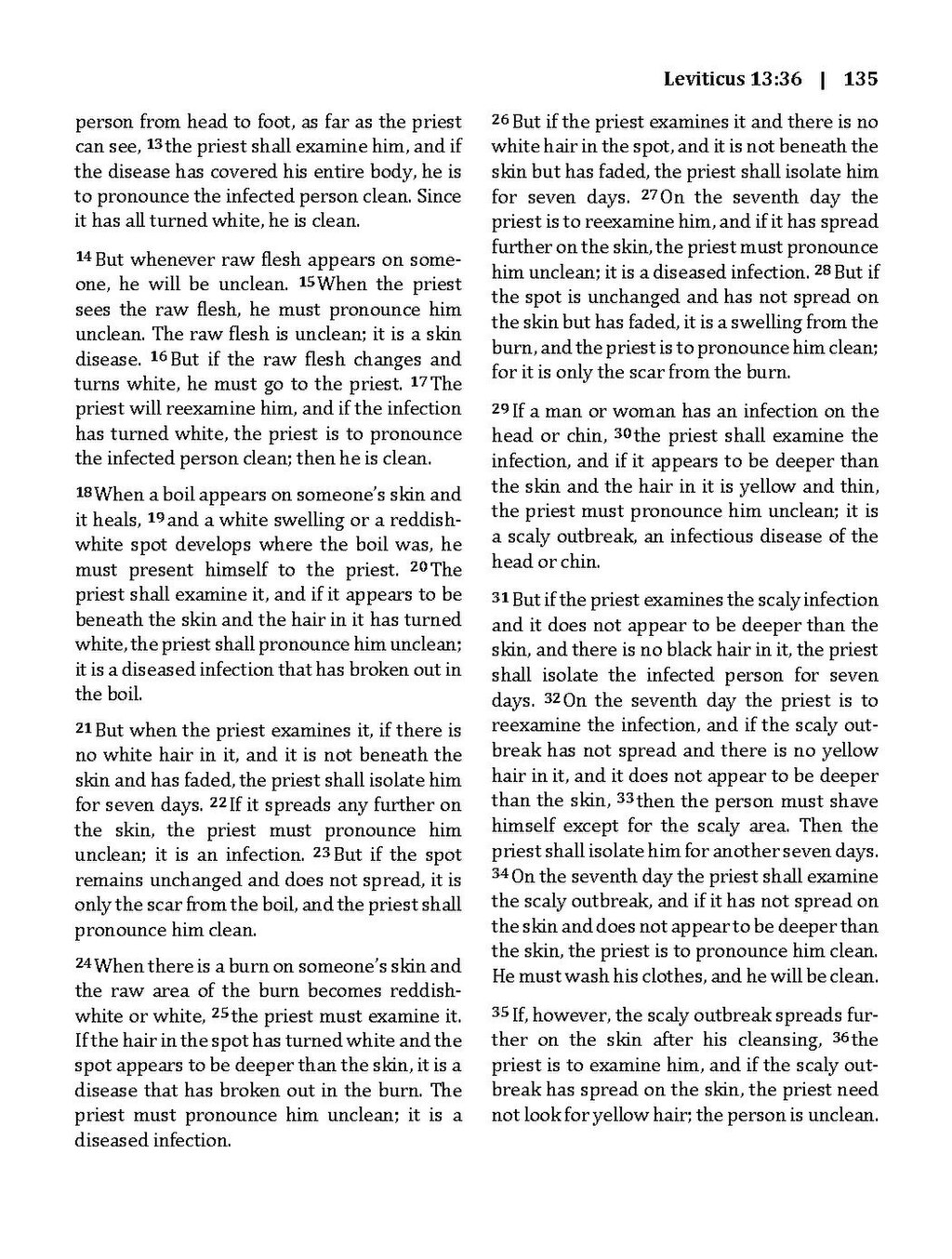person from head to foot, as far as the priest can see, 13 the priest shall examine him, and if the disease has covered his entire body, he is to pronounce the infected person clean. Since it has all turned white, he is clean.
14 But whenever raw flesh appears on someone, he will be unclean. 15 When the priest sees the raw flesh, he must pronounce him unclean. The raw flesh is unclean; it is a skin disease. 16 But if the raw flesh changes and turns white, he must go to the priest. 17 The priest will reexamine him, and if the infection has turned white, the priest is to pronounce the infected person clean; then he is clean.
18 When a boil appears on someone’s skin and it heals, 19 and a white swelling or a reddish-white spot develops where the boil was, he must present himself to the priest. 20 The priest shall examine it, and if it appears to be beneath the skin and the hair in it has turned white, the priest shall pronounce him unclean; it is a diseased infection that has broken out in the boil.
21 But when the priest examines it, if there is no white hair in it, and it is not beneath the skin and has faded, the priest shall isolate him for seven days. 22 If it spreads any further on the skin, the priest must pronounce him unclean; it is an infection. 23 But if the spot remains unchanged and does not spread, it is only the scar from the boil, and the priest shall pronounce him clean.
24 When there is a burn on someone’s skin and the raw area of the burn becomes reddish-white or white, 25 the priest must examine it. If the hair in the spot has turned white and the spot appears to be deeper than the skin, it is a disease that has broken out in the burn. The priest must pronounce him unclean; it is a diseased infection.
26 But if the priest examines it and there is no white hair in the spot, and it is not beneath the skin but has faded, the priest shall isolate him for seven days. 27 On the seventh day the priest is to reexamine him, and if it has spread further on the skin, the priest must pronounce him unclean; it is a diseased infection. 28 But if the spot is unchanged and has not spread on the skin but has faded, it is a swelling from the burn, and the priest is to pronounce him clean; for it is only the scar from the burn.
29 If a man or woman has an infection on the head or chin, 30 the priest shall examine the infection, and if it appears to be deeper than the skin and the hair in it is yellow and thin, the priest must pronounce him unclean; it is a scaly outbreak, an infectious disease of the head or chin.
31 But if the priest examines the scaly infection and it does not appear to be deeper than the skin, and there is no black hair in it, the priest shall isolate the infected person for seven days. 32 On the seventh day the priest is to reexamine the infection, and if the scaly outbreak has not spread and there is no yellow hair in it, and it does not appear to be deeper than the skin, 33 then the person must shave himself except for the scaly area. Then the priest shall isolate him for another seven days. 34 On the seventh day the priest shall examine the scaly outbreak, and if it has not spread on the skin and does not appear to be deeper than the skin, the priest is to pronounce him clean. He must wash his clothes, and he will be clean.
35 If, however, the scaly outbreak spreads further on the skin after his cleansing, 36 the priest is to examine him, and if the scaly outbreak has spread on the skin, the priest need not look for yellow hair; the person is unclean.
